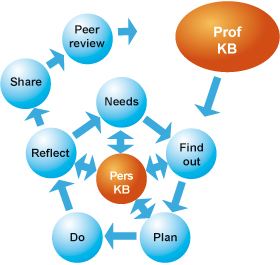Use 'Print preview' to check the number of pages and printer settings.
Print functionality varies between browsers.
Printable page generated Thursday, 5 February 2026, 10:46 AM
V25p1: Assessing ICT KS1
Course information
This is one of the ‘project courses’ from Vital. It provides an opportunity for you to plan, carry out and evaluate a project in your classroom. It is supported by a set of resources and activities to give you ideas for possible projects. You are not expected go through every resource but to pick those which are most relevant to your interests, context and possible project.
You will need access to:
- a computer with a web browser
- headset (including microphone and speakers) for online tutorials (optional webcam)
- a class/group of students – groups could be within classes, whole classes, or groups across classes (e.g. clubs) and schools (e.g. clusters of schools or in collaborative projects).
Duration of the course: You should allow for about one to two hours per week for this on top of the time taken to do the project in your classroom or other setting.
Learning outcomes
N.B. The technology or technologies to be used are identified in the Resources section for the course.
Professional and reflective practitioner skills
At the completion of this course, you should be able to:
- identify opportunities for assessing students’ use of ICT
- reflect on and discuss the methods used for assessing ICT
- reflect on and discuss the impact of assessment of ICT on learning
- share your learning with others in your field.
Practical skills
At the completion of this course, you should be able to:
- use a variety of means for assessing students’ ICT capability.
Knowledge and understanding
At the completion of this course, you should be able to demonstrate an understanding of:
- the range of assessment types and their applicability to ICT capability, including diagnostic, formative, peer, ipsative and summative
- a range of methods for assessing students ICT capability.
Cognitive skills
At the completion of this course, you should be able to:
- critically review the assessment process in respect of ICT capability
- share these reviews with others, constructively critiquing others’ views.
Course schedule
| Week | Course activities | Type | Approximate duration |
| 1 | Activity 1 Getting to know others on the course | Online | 30 minutes |
| 1–2 | Activity 2 Exploring the resources | Online tutorial | 1 hour |
| Activity 3 Guidance on using resources and planning for project | 30 minutes | ||
| 3 | Activity 4 Drawing up course plans | Individual planning | 1 hour |
| Activity 5 Confirmation of course plans | Online tutorial | 1 hour | |
| 4–8 | Activity 6 Classroom project | Classroom | No extra time needed |
| Activity 7 Reflective journal | Individual | 30 minutes to 1 hour per week | |
| Activity 8 Keeping in touch with your cohort and facilitator | Online | 30 minutes to 1 hour per week | |
| 9 | Activity 9 Reflecting and reporting back | Online | 1 hour |
| Activity 10 Extracting our shared learning | Online | 30 minutes to 1 hour | |
| Activity 11 Course evaluation and certification | Online | 30 minutes to 1 hour | |
| Total | 9–12 hours over 9 weeks |
Introduction
The course applies a practitioner research model to look at how aspects of learning may be supported and enhanced through the use of technology. Your starting point is ‘a need’ within your practice, which you will investigate how to address. This will involve exploring how other people have already attempted to address a similar need in their practice (bringing in some practical examples of how particular technologies are used in schools), before you plan and implement their use in your school and reflect and discuss what worked and what needs further refinement.
At the heart of your learning is a project that you will carry out in your teaching and learning setting. These materials are written assuming that you have signed up for a course, although they can be followed in self-study mode. Where you have signed up for a course you will be carrying out a project with similar focus to others, both in terms of the phase of education, technology and the curriculum.
Throughout you have an opportunity to share experiences with other participants. Where you have signed up to use these materials as part of a course you will have a facilitator who will conduct tutorials and help support you in your learning and reflection.
The Practitioner Research Cycle
Vital courses are based on a Practitioner Research Cycle as shown in the diagram below.

This cycle draws on, and develops, personal and professional knowledge bases. The latter may be seen in the literature, resources, policies and other materials that are used to inform practice.
Throughout the course small icons will indicate the stage of the cycle being addressed.
NB Prof/Pers KB = Professional/Personal knowledge base
Introducing ourselves
For the purposes of clarity the activities from this point on assume that you are on a course with others. If you are in self-study mode then some activities will not be applicable.
This part of the course provides an introduction to each other, to get a feel for the contexts others are working in. This may allow for cross-fertilisation of ideas in projects and for supported reflection.
 Activity 1 Getting to know others on the course
Activity 1 Getting to know others on the course
The objective of this course activity is to get to know the other participants on this course
Task 1 Go to the course forum and the ‘Introductions’ thread. There it will explain how these introductions will be done – e.g. face-to-face, online, using a forum.
Task 2 Where a forum is used, introduce yourself, and your context, telling the other course members what you hope to get out of the course. Reply to some of these messages, identifying areas of overlap with your own context and interests.
Using the course resources in your project
These materials, are complemented by supporting resources and activities, which you can use to support your project. Your facilitator, and others on the course, will help to you to plan and refine your ideas for this project.

 Activity 2 Exploring resources
Activity 2 Exploring resources
The objective of this course activity is to develop your understanding of the resources provided to support this course.
Go to the Resources section, explore what is there and reflect on how might use them in your classroom or other setting. You are not expected to look at all of the resources, but to choose those which seem to be of most interest and relevance to you. In Activity 4, you will develop a project of your own and these resources are designed to help frame that project. As you explore you might want to make notes that you discuss with your facilitator in Activity 3.

 Activity 3 Guidance on using resources and planning for project
Activity 3 Guidance on using resources and planning for project
The objectives of this course activity are:
- to develop your understanding of the resources available
- to develop a shared understanding of suitable project resources.
Go to the course discussion forum and to the thread ‘Tutorial: Resource and project guidance’. This will contain guidance on how the tutorial will be conducted – for example, it may be online or face-to-face. The tutorial will be supported by discussion in the forum. When you attend the tutorial, online, you should be prepared to discuss initial ideas for your project.

 Activity 4 Drawing up course plans
Activity 4 Drawing up course plans
The objective of this course activity is to plan your use of the resources and associated technology in a project in your setting.
You will need to consider:
- how your plan fits with your performance management or other targets
- the classes or groups of learners to be used in the project
- the learning gains or learning intentions
- the intended purposes for using the technology and resources
- what evidence you will look for of the impact of the resources and technologies on learning and teaching
- how you will share your findings with others in your setting.
 Activity 5 Confirming course plans
Activity 5 Confirming course plans
The objectives of this course activity are to:
- develop your understanding of the resources available
- develop a shared understanding of suitable project activities.
Go to the course forum and to the thread ‘Confirming plans’. You should go to this thread and outline what you plan to do. Comment on others’ plans looking, in particular, for plans which are similar to your own so that you may share ideas and findings.
The project
Having developed your plan on how to use the supporting resources in your classroom you now need to carry out the project. This will last for about half a term. Each week, as you work through the project, you should reflect on what you have learnt and the impact it is having on learners. You should be prepared to share your thoughts and reflections with others. 
 Activity 6 Classroom project
Activity 6 Classroom project
The objective of this course activity is to carry out your plan for the use of the resources and technology in your classroom. It is not intended that, in doing so, you spend any extra time over and above your normal teaching and preparation time.

 Activity 7 Reflective journal
Activity 7 Reflective journal
The objective of this course activity is to reflect systematically on what you have learnt.
Each week you should note down what you have learnt from the project. This might take the form of reflection on your plans in Activities 3 and 4. These reflections may be kept in a blog or some other electronic journal. You will need to use these reflections to inform Activities 8 and 9.

 Activity 8 Keeping in touch with your cohort and facilitator
Activity 8 Keeping in touch with your cohort and facilitator
The objectives of this course activity are
- to share your learning as the project progresses
- to gain support from colleagues on the course
- provide support for others in the cohort.
Each week you will receive a message from your facilitator to support your progress through the course and project.
Go to the course forum and to the thread ‘Project discussions’. Share how your project is going, what you are learning and any other resources that you have found to be of use. Respond to the message sent by your facilitator.
You can also use the forum to ask for support and guidance and to support and guide others. You should check back into the forum regularly – little and often is probably the best method here (15 minutes every other day is likely to be much more useful than a one hour block once a week).
Reflect, evaluate and share with others
Having carried out a classroom project, you will share your reflections of what you learnt from it.
Use the key questions below to help evaluate your project. Use your initial planning sheet and the reflections you have captured as a source of data to help you do this.
- What did the learners do? This is a descriptive activity that explains your action with the learners.
- What did they learn and how do you know? This is an issue of assessment including observation, discussion, question and answer, testing, etc
- Was it worthwhile, i.e. did it succeed in meeting your targets? This question relates to your purposes and intended learning outcomes.
- What did I do? Practitioner research is often done by individuals in their own work. This question requires a description of your own actions.
- What did I learn? This requires analysis of your data and reflection on your answers.
- What do I intend to do next? This relates to your next steps for action. This is where you will try to do things to achieve an improvement and to make the work you do with learners more worthwhile in your terms.
Adapted from Open University Curriculum in Action materials (1981)

 Activity 9 Reflecting and reporting back
Activity 9 Reflecting and reporting back
The objectives of this course activity are
- to share your reflections on the project
- give feedback to others as they reflect on their projects.
Make a brief presentation to share your findings – maybe as a couple of slides, short video, images etc. Go to the forum, in the thread ‘Reflections’ upload your presentation, and discuss:
- the extent to which your intended learning outcomes were achieved
- the evidence you have for this
- the ways in which you shared your project with others in your setting
- key reflections emerging from the consideration of the key questions for evaluation (listed above).
The use of technology in learning and teaching will provide you with evidence that may be useful when considering the Professional Standards for Teaching. You will have collected evidence from planning through to your notes and evaluation to discussion in the forum. Such evidence may be useful to you when demonstrating ways in which you have met the standards.
Depending on the stage of your career, certain Training and Development Agency for Schools TDA standards may be more relevant than others. Click the ‘Discussion’ button to reveal a possible set of standards. If appropriate you can reflect on these in your feedback to this activity.
Discussion
 TDA standards relevant to you might include the following:
TDA standards relevant to you might include the following:
- C7 Evaluate their performance and be committed to improving their practice through appropriate professional development.
- C8 Have a creative and constructively critical approach towards innovation; being prepared to adapt their practice where benefits and improvements are identified.
- C17 Know how to use skills in literacy, numeracy and ICT to support their teaching and wider professional activities.
- C27 Design opportunities for learners to develop their literacy, numeracy, ICT and thinking and learning skills appropriate within their phase and context.
- P10 Contribute to the professional development of colleagues through coaching and mentoring, demonstrating effective practice, and providing advice and feedback.
- E2 Research and evaluate innovative curricular practices and draw on research outcomes and other sources of external evidence to inform their own practice and that of colleagues.
- E14 Contribute to the professional development of colleagues using a broad range of techniques and skills appropriate to their needs so that they demonstrate enhanced and effective practice.
Shared learning

The reflective practitioner cycle is based on developing the professional knowledge base. We have come to the end of the personal reflection phase and will now develop a common understanding of what we have learnt. We will share the key learning points as a group so that these may be collated and added to the community knowledge.
 Activity 10 Extracting our shared learning
Activity 10 Extracting our shared learning
The objectives of this course activity are to discuss and agree what we have learnt as a group.
Go to the course forum and, in the Discussion called ‘Shared Learning’, post the key learning points that have emerged for you during the course. With your facilitator, agree on the common shared learning from the group.
Evaluation
This final section allows for evaluation.
 Activity 11 Course evaluation
Activity 11 Course evaluation
The objectives of this course activity are to complete an evaluation form and rate and review the course.
Your task is to complete the evaluation questionnaire, which can be found on the course page. There are also links there to print a certificate and rate the course. The certificate will be ‘released’ by your facilitator.
Resources
The resources here are designed to be linear: Resource 2 following on from Resource 1 and so on. You should start by reading them all to look at which aspects you wish to concentrate on in your project. You do not need to do all the activities, however. Select those that are most appropriate to your context, interests and possible projects.
Where possible we provide links to materials hosted by Vital. However, this is not always feasible so please bear in mind that over time material from external websites may become unavailable or obsolete.
1 What is effective assessment?
This resource should enable you to critically review the assessment process in respect of ICT capability.
Preparatory reading
The UK assessment agenda is dominated by guidance from the Primary Strategies, which has its roots in the publication Inside the Black Box by Paul Black and Dylan Wiliam.
You should also consider what the National Curriculum indicates as the current legal requirements for children in Primary School.
Have look at the National Strategies website for assessing pupils’ progress (APP). Consider the goals it outlines for the assessment of children.
Reflection
The summary review of Beyond the Black Box differentiates between the characteristics of assessment that promote learning and those that simply add procedures.
Spend some time evaluating what you do with regard to assessment in ICT at KS1, how much is merely adding procedures?
For each of these features of assessment, which do you have in place, which do you need to learn more about and which do you need to support colleagues with?
- it is embedded in a view of teaching and learning of which it is an essential part
- it involves sharing learning goals with pupils
- it aims to help pupils to know and to recognise the standards they are aiming for
- it provides feedback which leads to pupils recognising their next steps and how to take them
- it involves pupils in self-assessment
- it is underpinned by confidence that every student can improve
- it involves both teacher and pupils reviewing and reflecting on assessment data.
Key questions
What impact do you want assessment of ICT at KS1 to have upon the children in your school?
What level of information does the school leadership need about progress in ICT ?
2 How much to assess
This resource should enable you to demonstrate an understanding of:
- the range of assessment types and their applicability to ICT capability, including diagnostic, formative, peer, ipsative and summative
- a range of methods for assessing students’ ICT capability.
The resource should enable you to establish how much you wish to assess and at what level of detail you wish to make those assessments.
Consider these statements in the final section of the National Curriculum Section for ICT:
At the end of a key stage, teachers should judge which level description best fits the pupil's performance. Each description should be considered alongside descriptions for adjacent levels. When making a judgement at the end of a key stage, you may wish to note the following points.
Although you will want to be able to explain why you have awarded particular levels to pupils at the end of the key stage, there is no requirement for judgements to be explained in a particular way or to be supported by detailed collections of evidence for each pupil. Decisions about collecting information, about its purpose and how it should be used are matters for teachers working within an agreed school policy.
Reflection
- a. Does the ICT curriculum in your school make assessment easy or do you need to amend your schemes of work?
- b.Review these examples of assessment processes. Which meet legal requirements? Which are heavily procedural? How do they impact on planning and what is the cost benefit to learning?
- APP Ladder from Worcestershire LA
- Herefordshire ICT Assessment Records
- Herefordshire Primary ICT Progression Y1+2
- Hertfordshire ICT Assessment Advice
- Kent KS1 Tracking Sheet
- Kent ICT Assessment Rocket
- ICT Assessment Wokingham (last 2 links on this page are obsolete)
- Northern Grid for Learning
- Newham It@ss
- Redbridge approach to ICT assessment
- Right2learn diagnostic tests
- Lewisham ICT Pupil Learning diaries
Does the ICT curriculum in your school make assessment easy?
Do you need to amend your schemes of work?
What do you want to assess?
The National Curriculum divided ICT skills and capabilities into four areas:
- Finding things out
- Developing ideas and making things happen
- Exchanging and sharing information
- Reviewing modifying and evaluating work as it progresses.
Key questions
Does this model offer the holistic view of ICT capability you wish to develop in pupils?
Are there additional areas you wish to make judgments about?
Where do social web tools (Web 2.0) and e-safety issues fit?
How might you assess pupils’ capability in these areas?
What impact does this curriculum have on the subject knowledge of your teachers?
Do you wish to record and report the legal requirement or record and/or report on a more detailed ladder of skills?
Look again at the list of National Curriculum areas of study above. Think of examples in these areas applicable to your Year 1 children and Year 2 children. What about for e-safety as a fifth area?
3 How do I validate assessment judgements?
This resource will enable you to ensure confidence in judgements on ICT capability in your school.
The first stage is to establish how much evidence you wish to keep (see Resource 2) and the nature of that evidence. You may wish to keep tracking sheets or ask colleagues to create portfolios of work.
There are a variety of commercial packages available to enable you to manage the record-keeping process:
The second stage is to consider if any of these portfolios of work will support your school in improving consistency and quality of their assessment. Some resources to help with this are:
The National Strategies have very solid and clear guidance on secure judgements in the APP context. Unfortunately this does not support years 1 and 2 in ICT.
Finally, will you encourage children to keep their own e-portfolio?
Reflection
- a.Here are some resources to help you in evaluating the use of e-portfolios for assessment. When you read them keep in mind the potential benefits to learning but also demands they could place on time for children and teachers.
- b.What are the costs and benefits of using each these tools for assessment?
- E-portfolios
- Other electronic tools
- Tracking sheets
- APP style portfolios
4 Planning and implementing the changes to assessment procedures
This resource looks at processes in school that are impacted by changes to assessment procedures.
If you identify changes and improvements that you wish to make, then first you must consult on the changes you need to make to your ICT policy, and next you must consider how to effect sustainable change.
If you have no changes to make, you should consider encapsulating your evaluation of your practice (see Resources 1 to 3) as a report to present to governors and for your senior leadership to use as evidence for their self-evaluation form.
Reflection
Below is a checklist of the stakeholders in the change consultation process:
- Colleagues
- Key stage leader
- Senior leadership of school
- Children
- Governors
- Parents.
- Are you able to explain what you wish to do and why?
- Can you justify it in terms of learning gain for the children?
Once you have established the change in policy, you should consider how to embed changes in practice.
There is little evidence to suggest that whole staff training in assessment is effective.
Spend some time considering the Diffusion of Innovations.
- How will your approach differ for the innovators and early adopters in your school when compared with your approach for the laggards?
- Will you phase the implementation to give the late majority the evidence of success required to overcome their scepticism?
Now consider the conscious competence learning model.
- How will you raise awareness in your colleagues to enable them to address the gaps in their understanding required to implement your policy?
Having considered these issues, you must now create an action plan to communicate your intentions to the school leadership, colleagues and governors. Avoid writing ‘ongoing’ tasks, try to create a Gantt chart for your activities.
- You could choose to create this using something like
- http://www.aceproject.com/ or
- http://www.schoolcentre.net/.
A Gantt chart will push you to plan specific quantifiable activities and to contextualise them visually. Plan to collect evidence of the improvements you have made, so that you can supply that evidence to the school leadership to include in their self evaluation documentation.
References
Acknowledgements
Authors: Pete Yeomans
Reviewers: Terry Freedman, Pete Bradshaw
Editor: Matthew Driver